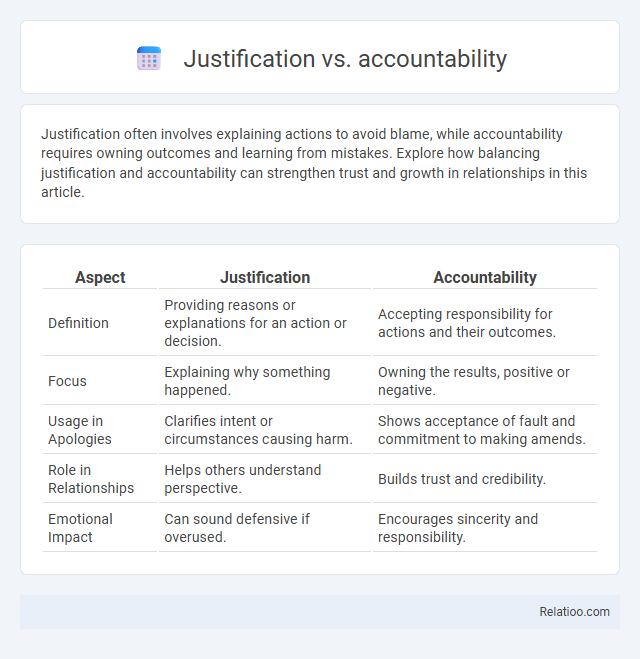Justification often involves explaining actions to avoid blame, while accountability requires owning outcomes and learning from mistakes. Explore how balancing justification and accountability can strengthen trust and growth in relationships in this article.
Table of Comparison
| Aspect | Justification | Accountability |
|---|---|---|
| Definition | Providing reasons or explanations for an action or decision. | Accepting responsibility for actions and their outcomes. |
| Focus | Explaining why something happened. | Owning the results, positive or negative. |
| Usage in Apologies | Clarifies intent or circumstances causing harm. | Shows acceptance of fault and commitment to making amends. |
| Role in Relationships | Helps others understand perspective. | Builds trust and credibility. |
| Emotional Impact | Can sound defensive if overused. | Encourages sincerity and responsibility. |
Understanding Justification and Accountability
Understanding justification involves providing clear reasons or evidence supporting your decisions and actions, ensuring transparency and credibility. Accountability emphasizes your responsibility to accept the consequences and answer for outcomes, reinforcing trust and ethical behavior in any process. Balancing justification with accountability empowers you to establish integrity and maintain authority in professional or personal contexts.
Key Differences Between Justification and Accountability
Justification involves providing valid reasons or explanations for actions taken, emphasizing the rationale behind decisions to demonstrate they are appropriate or necessary. Accountability refers to being responsible for outcomes, requiring individuals to answer for their actions and accept consequences, which establishes trust and transparency in processes. The key difference lies in justification focusing on the explanation and rationale, while accountability centers on ownership of results and responsibility for actions.
The Role of Justification in Decision-Making
Justification in decision-making involves providing valid reasons and evidence that support a particular choice, ensuring transparency and logical coherence in your actions. Accountability complements this by holding individuals responsible for the outcomes, linking decisions to consequences and ethical standards. While justification focuses on explaining the rationale, accountability ensures that you stand by those decisions and accept responsibility for their impact.
How Accountability Shapes Organizational Culture
Accountability shapes organizational culture by fostering transparency, trust, and a sense of responsibility among employees, which drives consistent performance and ethical behavior. When individuals are held accountable, your organization cultivates a proactive environment where mistakes are acknowledged and addressed, leading to continuous improvement. This dynamic contrasts with mere justification, which often centers on explaining actions without necessarily promoting ownership or positive change.
Examples of Justification in Practice
In legal contexts, justification serves as a valid defense explaining why an action was necessary, such as self-defense in a criminal case where the defendant proves their actions prevented imminent harm. Accountability involves being held responsible for actions, like a corporate executive facing penalties for ethics violations regardless of intent. An example of justification in practice includes law enforcement officers using reasonable force during arrests, justified by the need to ensure safety and uphold the law.
The Importance of Accountability in Leadership
Accountability in leadership ensures that leaders take responsibility for their actions and decisions, fostering trust and credibility within teams. Unlike justification, which explains or defends decisions, accountability requires transparent acknowledgment of outcomes and a commitment to corrective measures. Emphasizing accountability promotes ethical behavior, improves performance, and drives organizational success by aligning leadership actions with established goals and values.
When Justification Undermines Accountability
When justification overshadows accountability, it can erode trust by allowing individuals to excuse poor decisions instead of owning outcomes. Your organization may face challenges in performance evaluation, as constant explanations hinder transparent assessment of responsibility. Balancing justification with clear accountability ensures that actions are not only explained but also appropriately owned and corrected.
Balancing Justification and Accountability for Success
Balancing justification and accountability is essential for organizational success, where justification provides the reasoning behind decisions and actions, ensuring transparency and trust. Accountability enforces responsibility, requiring individuals or teams to answer for outcomes and maintain performance standards. Achieving harmony between these concepts drives effective decision-making, improves stakeholder confidence, and fosters a culture of continuous improvement.
Challenges in Implementing Accountability Systems
Implementing accountability systems faces challenges such as unclear roles, lack of transparency, and resistance to change within organizations. You may encounter difficulties in establishing consistent performance metrics and ensuring stakeholders accept responsibility without shifting blame or demanding constant justification. Effective accountability requires robust frameworks that balance monitoring with support to overcome these obstacles.
Building a Culture of Justification and Accountability
Building a culture of justification and accountability requires clear communication of expectations, where employees understand the reasons behind decisions and accept responsibility for their actions. You foster transparency by encouraging evidence-based explanations and regular feedback, which strengthens trust and improves organizational performance. Emphasizing both justification and accountability ensures alignment between individual behaviors and overall business goals.

Infographic: Justification vs Accountability
 relatioo.com
relatioo.com